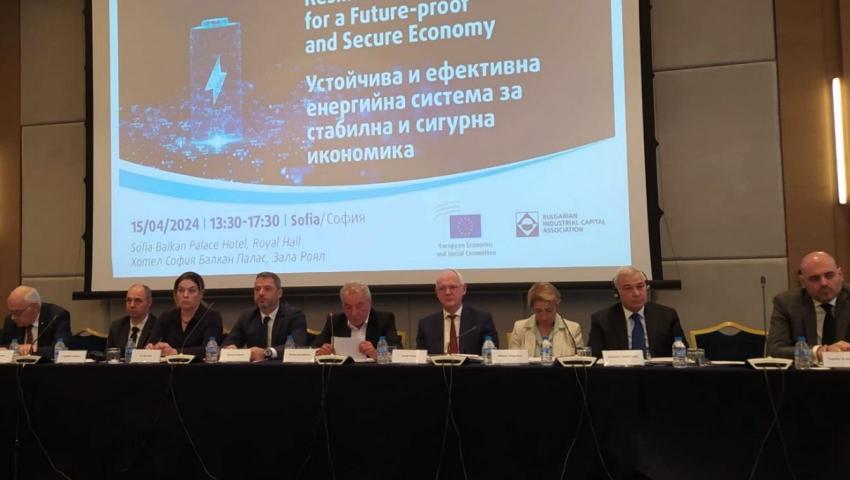Delyan Dobrev: We are preparing a "flexible model" for joining RES

A "flexible scheme" for the connection of renewable energy sources (RES) is expected to be introduced in our country within a few months. It will be introduced with a change in the Energy Law. In its essence, this means densification in the use of the network, which will make it economically efficient. In addition, time and money will be saved from its expansion. This was explained by Delyan Dobrev, the chairman of the energy committee of the National Assembly, in his speech before the forum "Sustainable and efficient energy system for a stable and secure economy" of AICB and the European Social Council. He argued with the current insufficient number of hours of operating RES to densify the use of the network.
"We have been working with ESO for a little more than a year on the idea of flexible joining, because the development of the network is important for every single country. It is somehow a pity that the network is used only 1,300 hours out of 8,700 hours a year and we make more network to use it again for 1,300 hours or 2,000 hours," said Delyan Dobrev. In support of his words, he pointed out that a study was done this year, which showed that if in our country "wind and sun are combined at the same point, they will be detected only 2% of the time, that is. will overlap only 2% of the time," explained the chairman of the energy commission. That's why, according to him, work is being done to expand the network in the indicated way, through compaction "Because the other expansion costs a lot of money and takes a lot of time and is not efficient," said Dobrev.
"There is no economic logic to build a network to use 12 or 15-20 percent of it. This model we propose would densify the network and make its use more efficient. And it's quite simple - the one who is second can join in the same section for capacity with a temporary scheme", he added and gave an example of the network in North-Eastern Bulgaria, which is completely blocked by wind investments (because there is wind there) according to the first projects that have completely exhausted its capacity. "They have exhausted it, but within those approximately 2,000 hours when the wind is blowing, but during the other 6,000 hours this network is free, it is not loaded," explained the chairman of the energy commission.
He added that "with a change in the law, it will be asked to allow other technologies to join in this place where 2000 hours of the network are used". "For example, from the sun. As the one connected second, in those 2% of the time when there is an overlap of generation from PV and wind, the second one will not produce at the expense of the first. This means that the second entrant to the network under this flexible model will have to agree 2 or 3% of the time to be restricted at the expense of the first entrant." In addition to wind and sun, according to Dobrev, this model would also allow connection with batteries from a third manufacturer.
"This is something that will allow Bulgaria to develop and in which we can be pioneers. If not the first, then Bulgaria may be one of the first countries in Europe to implement this model. So, it's something that has to happen in the next few months, with only the election delaying that process," said the chairman of the energy committee.
Earlier in his speech, Delyan Dobrev commented that for energy in the medium term, both extremely high prices and extremely low prices are a good thing. "Of course, the high prices, which last year reached BGN 800-900 per megawatt hour, were a big challenge for the business. However, then Bulgaria was the first in Europe to take measures and began to compensate businesses in these difficult times. These high prices, which made it difficult for business, for which business had compensations, caused a boom in RES investments," he said, recalling that the European Commission implemented the same policy.
According to him, this boom in RES has attracted tens of thousands of entrepreneurs to Bulgaria.
"You see the price in good weather and in the spring and fall going to negative levels. Last week there was a day with minus BGN 88/MWh. That is, they pay BGN 88 to consume this megawatt hour. This is bad for RES, but good for business. Because both are good for the energy industry, because, as I have already said, high prices attract investments. But low prices also attract investment. Why? Because they pave the way for investment in storage," added the chairman of the Energy Commission. In this regard, he reminded that our country, as soon as possible, must launch the projects for the two PAVETS – Batak and Dospat, as well as small projects with batteries. According to him, this is also the aim of the program of the Ministry of Energy - financing with grant funds under the PVU. "The invisible hand of the free market will ensure that the energy sector develops so that this transition takes place in the fastest way," said Delyan Dobrev.
"We should not be discouraged either by the very high prices or by the low ones. Quite the opposite – both high prices are a good thing and very low prices are a good thing. What would have literally stopped the transition would have been some prices from the constant 100 BGN," said Delyan Dobrev. According to him, such a constant price would not allow interest in either RES or batteries, because it does not lead to returns from additional investments in renewable energy.
